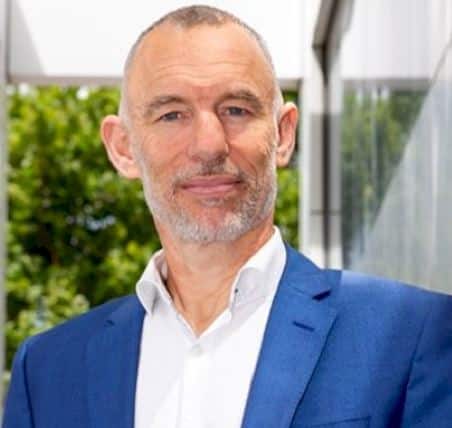“Our short term goal never changes. Internally for us, it is to challenge, to question, to explore, to seek innovation, never to view one particular line of communication as being the one that will endure forever.” Momentum Media Director Alex Whitlock explains the company’s approach to change and how it articulates the value of niche media to its clients.
Founded in 2006, Momentum Media has grown from two people and one brand to over 140 staff and 25 brands today, achieving annual revenue growth of 25 per cent since inception.
The media group provides market and business intelligence to financial, real estate, legal, defence, aviation, and SME business sectors across print, digital, events, broadcast, research, and social platforms.
Momentum Media is unique in terms of its capabilities for its individual audiences, with particular strength in broadcasting. Since 2016, the company has launched 13 podcasts and recently announced a partnership with audio-visual experience company Austage Events to deliver live broadcast virtual events.

Director and Co-Founder Alex Whitlock says “Our total audience is in the millions but they are all in unique audience sectors. So in some ways, we are a niche publisher, and in other ways, we reach an audience en masse.”
TMSN Editor Lyndsie Clark caught up with Whitlock to chat about the challenges and opportunities that the impact of COVID-19 has presented the company and niche media generally, and Whitlock’s top tips for niche publishers in the current business environment.
LC: Are there particular ways that you’re working with your advertising and sponsor clients at the moment to engage with their audience?
Alex Whitlock: Yes, our broadcast channels are a unique way that our partners can engage with our audiences. Broadcast is certainly a key platform that we have done for many years. We’ve got very strong content-driven podcasts across all of our platforms.
My business partner Phil Tarrant runs the Smart Property Investor podcast, and he gets about 100,000 downloads a month. So we’ve generated fairly significant sponsorship revenue via our podcast channels.
We involve a lot of our sponsors and partners on our broadcasts, whether we play an audio advertisement on one of our podcasts, or whether we’re doing a live stream where we have a partner represented on a panel – as long its content-driven, and as long as it offers value to the audience, there are some great commercial opportunities to bring sponsors and partners in to participate and be part of the story.
But I think that the success of new channels like broadcast is really down to the mindset of the lead in the media group, and their ability to articulate new ideas and generate excitement. Articulate them clearly. Show how partners can capitalise on new channels to do commerce.
LC: Has Momentum Media changed its messaging to clients significantly since the COVID-19 pandemic?
AW: Fundamentally no, because we are always about accurate information, business intelligence, and helping our business audiences understand their marketplace. And so, the message is still the same, it’s about the value in terms of what we deliver to our audiences.
In terms of sales, our message is to articulate to our partners and sponsors about how they can capitalise on
the increased activity on our websites, and also to really articulate why niche media is so important and why it is such a direct connection with these very segmented audiences.
We’re also looking at how we compete with other options for marketing spend. You do increasingly compete with Facebook and other social media, even though it has long been known that there is a lot of misinformation on these platforms.
Niche media need to highlight this to their advertisers and sponsors – you don’t need to tell your audience because they know, they have trust in the information and they rely on the information you give them.
Articulate to advertisers why niche media is so important now: because your audience is looking for critical information provided by qualified journalists, people who are passionate about what they do, and who are very educated on their subject matter. This is the perfect piggyback for any sponsor or a partner, whether it’s digital, print, or broadcast content.
Knowing your subject matter and giving the right information to your audiences has value for your partners.
Our sales team understands that; they’re saying the same things that they always have. But they are really highlighting what that translates into and why we’ve seen double sometimes treble our engagement on our platforms.
LC: Do you think that trajectory for the B2B media sector will continue after COVID-19?
AW: Absolutely. There isn’t going to be an “after COVID-19”. This is the new normal. This is not the last pandemic of its type that is going to come our way. And even if it’s a decade before the next one comes, the fear will remain. This is going to change the way that most of us view the world forever.
I’m not saying things won’t go back to how they largely worked before COVID-19, but I think there’s going to be a changed view of things, and I think that the economic aftershock will continue for a long time. A lot of businesses are going to take a long time to recover. We don’t yet know how deep a recession is going to be and how far unemployment is going to stretch.
Businesses are going to need to look at how they re-engage with their marketplaces, and niche media is going to play a critical role in staying in contact with their audiences to provide them with relevant, sharp, accurate information.
It’s a big opportunity for niche media, to keep that engagement and to articulate that message.
LC: How do you think the relationship between print and digital channels will change?
AW: It’s really down to each publisher’s approach to their marketplace. For us, we started in 2006 as a digital business. We support print – I personally love print, I’ve worked in print for many years before that – but I think everything should be dictated by how your audience wants to consume their information. And if your audience wants to consume information by print, print is the perfect way to reach them.
I don’t think you can necessarily dictate to your audience. You can highlight new opportunities and you should constantly test and try new areas of engagement. But I think it’s really dictated by how your audience likes to engage.
Having said that, I also think there is valuable stability for businesses to have foundations across various platforms.
For us we’ve been hit very hard, technically, by events because we ran 70 physical events – but we pivoted very quickly to rethink the way we engage with the people that attend our events because we’re driven by that audience engagement. So we’ll now deliver our events via broadcast platform.
For niche publishers or niche media businesses, to have alternative platforms to engage with your audience strengthens your proposition. I’m not saying it’s necessarily the right way to go or what you should be doing, but it has benefits when circumstances change and you need to pivot quickly.
Since the COVID-19 outbreak, we’ve switched very much into our broadcast capabilities and our digital platforms are going off the dial.
Print also provides an opportunity to send a different kind of content (longer-form articles) and a different sort of consumption of information to your audience. We don’t have print magazines for all of our verticals, but we do for three of our B2B titles and they’re very strong and highly profitable. Our audiences enjoy engaging with that information, and likewise our advertisers.
LC: What are the short-term goals that you want to accomplish for your brands during this time?
AW: Our short term goal never changes. Internally for us, it is to challenge, to question, to explore, to seek innovation, never to view one particular line of communication as being the one that will endure forever.
We constantly monitor how our audiences want to engage with us. We’ve got a very diversified business. We are a media business but we also conduct research and provide outsourced communications and event management to other businesses. So we constantly look at how we can often value to our various audiences, be that for consumers of our information or for our commercial partners.
And we constantly look at how we can continue to grow revenue. We’re here to grow. We’re here to advance. We’re here to prosper. So we continually look at evolution. We embrace change. We love change, we get excited by change.
When this is your goal, open communication throughout the business is really critical because it gives you that opportunity to move quickly when required. Our journalists, our salespeople and designers, the people who run our accounts, our production teams, our event side – we keep everyone as engaged and informed as we possibly can. We catch up every day. That then means that when you have a chance to move you can.
We also work very hard to stimulate ideas and suggestions from within our teams so they in turn help drive innovation for us.
LC: It’s good to be dynamic.
AW: It is. I’m extremely passionate about media, I find media the most exhilarating role that I’ve ever worked in, I wouldn’t ever work in any other area. Because you can do so many things with so many different people in so many different areas.
You get to deliver real tangible value to your audiences. We connect with anywhere between one to four million depending on how you want to measure levels of engagement, and that’s a huge responsibility. And it’s also unbelievably rewarding.
There’s a robustness to niche journalism and information. I look at mainstream media in a continual feeding frenzy of what is topical right now – it doesn’t necessarily matter whether it’s important, but just what can get eyeballs onto the screen or onto the newspaper. And I understand that’s the remit of daily news. But when you cater to a niche audience, your depth of responsibility is far greater because you have an ongoing relationship with a very finite group of people.
I think that’s a really important thing for niche media – it makes you very accountable for what you do. You build these really deep relationships with your audiences. It’s a certain type of person who wants to be involved with that. I’m not saying that mainstream journalists aren’t passionate – they are – but you get this heightened sense of responsibility to a niche audience and an in-depth knowledge and understanding of what they do. It’s fantastic.
LC: What’s one tip that you can give other niche publishers in facing the challenges that COVID-19 has brought the publishing sector?
AW: I think change in isolation is very daunting and you can become overwhelmed if you’re not used to changing.
Sometimes you need to use your common sense to look around and see who does what well and do your best to replicate it. Use your common sense by asking if it can be applied to your audience, but don’t be afraid to put a foot forward.
This is my personal opinion, but I think procrastinating can sometimes be stifling. And sometimes it’s better just to get out and do something. If you want some feedback, speak to a panel of your audience, sponsors and advertisers, but understand that they don’t necessarily know what they don’t know.
We survey and do research all the time. We ask our audiences what they want. And then we use a certain amount of filling in the gaps to go “Okay, well, they want this”. Sometimes people don’t necessarily know what they want if they’ve never seen it before.
Don’t invest too much money into doing it so you don’t find yourself in a hole where you suddenly spend tens or hundreds of thousands of dollars. Find quick, easy, short ways to get into a new marketplace.
Have courage. Use your common sense, try and get feedback where possible. Go ahead and do it.
To read about Momentum Media’s pivot to virtual events, click here.
To find out more about Momentum Media, visit the company’s website.






Great interview. So agree re using common sense.